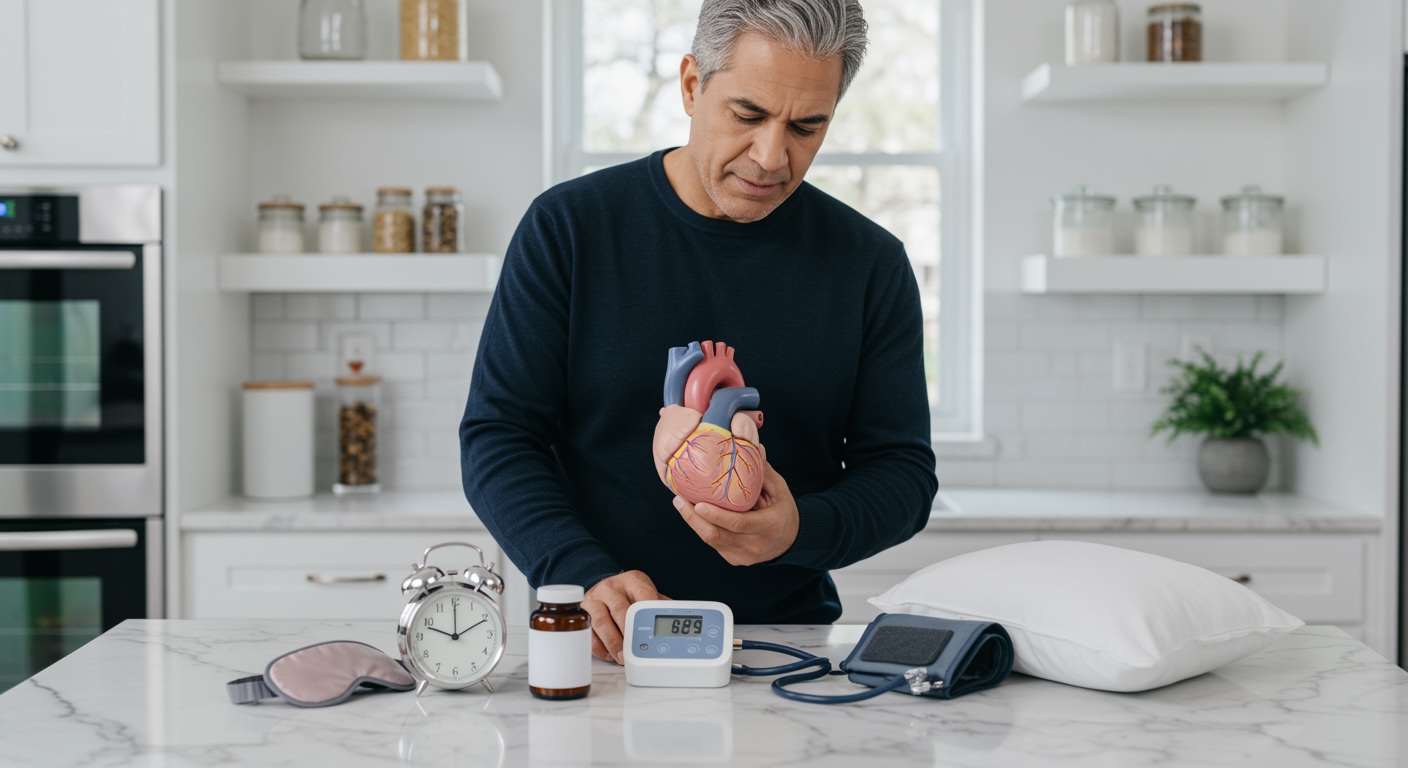✪ Key Takeaway: Yes, people with high blood pressure should sleep 7-9 hours nightly to naturally lower their numbers.
Introduction
Your blood pressure monitor shows those stubborn high numbers again, and you wonder if there is something simple you are missing.
You might be asking this question because you have heard conflicting advice about sleep and blood pressure, or perhaps your doctor mentioned that poor sleep could affect your cardiovascular health.
Hi, I am Abdur, your nutrition coach, and today I am going to explain exactly how sleep duration impacts blood pressure and why getting enough rest could be your most powerful natural remedy.
How Does Sleep Duration Affect Blood Pressure?
Sleep acts like a natural reset button for your cardiovascular system every single night.
During deep sleep, your heart rate slows down, your blood vessels relax, and your blood pressure drops by 10-20% compared to daytime levels.
This nightly dip is called nocturnal blood pressure dipping, and it gives your heart and arteries time to recover and repair from the day’s stress.
When you consistently sleep less than 6 hours per night, your body produces more stress hormones like cortisol and adrenaline.
These hormones keep your blood vessels constricted and your heart working harder, which maintains elevated blood pressure throughout the night.
Research shows that people who sleep less than 6 hours nightly have a 20% higher risk of developing hypertension compared to those who sleep 7-8 hours.
✪ Fact: Your blood pressure naturally drops 10-20% during quality sleep, giving your heart essential recovery time.
What Happens When You Sleep Too Little?
Sleep deprivation triggers a cascade of harmful changes in your body that directly raise blood pressure.
Your sympathetic nervous system, which controls your fight-or-flight response, becomes overactive when you do not get enough sleep.
This overactivity causes your blood vessels to remain constricted and your heart to pump harder, even when you should be resting.
Sleep loss also disrupts your body’s ability to regulate sodium, causing you to retain more fluid and salt.
This extra fluid increases the volume of blood your heart must pump, which raises pressure against your artery walls.
Additionally, chronic sleep deprivation increases inflammation markers in your blood, which can damage the inner lining of your blood vessels and make them less flexible.
Studies indicate that losing just one hour of sleep per night can increase your systolic blood pressure by 2-3 mmHg the following day.
✪ Pro Tip: Track your sleep hours and blood pressure readings to identify your personal sleep-pressure connection.
Can Too Much Sleep Also Raise Blood Pressure?
Sleeping more than 9 hours regularly can also negatively impact your blood pressure, though the mechanism differs from sleep deprivation.
Excessive sleep often indicates underlying health issues like sleep apnea, depression, or metabolic disorders that can contribute to high blood pressure.
Long sleep duration may also reflect poor sleep quality, meaning you spend more time in bed but get less restorative deep sleep.
People who sleep more than 9 hours nightly often have irregular sleep patterns, which can disrupt your body’s natural circadian rhythm.
This disruption affects hormone production, including those that regulate blood pressure like melatonin and cortisol.
Research suggests that both short sleepers (less than 6 hours) and long sleepers (more than 9 hours) have higher rates of hypertension compared to those sleeping 7-8 hours.
The sweet spot for blood pressure health appears to be 7-8 hours of quality sleep per night.
✪ Note: Both too little and too much sleep can raise blood pressure – aim for the 7-8 hour sweet spot.
How Can You Optimize Sleep for Better Blood Pressure?
Creating a consistent sleep schedule is the foundation of using sleep to manage your blood pressure naturally.
Go to bed and wake up at the same time every day, even on weekends, to help regulate your body’s internal clock.
Keep your bedroom cool (65-68°F), dark, and quiet to promote deeper sleep and better nocturnal blood pressure dipping.
Avoid caffeine after 2 PM and limit alcohol consumption, as both can interfere with your sleep quality and blood pressure regulation.
Create a relaxing bedtime routine that starts 30-60 minutes before sleep, such as reading, gentle stretching, or meditation.
If you snore or have sleep apnea, seek treatment immediately, as these conditions can prevent the normal nighttime blood pressure drop.
Consider keeping a sleep and blood pressure diary to track how different sleep durations affect your morning readings.
✪ Pro Tip: Measure your blood pressure at the same time each morning to see how sleep quality affects your numbers.
The Bottom Line
People with high blood pressure absolutely should prioritize getting 7-8 hours of quality sleep each night as a natural way to help lower their numbers.
Sleep is not a luxury when you have high blood pressure – it is medicine that works while you rest.
I would love to hear about your experience with sleep and blood pressure management, so please share your questions or thoughts in the comments below.
References
At NutritionCrown, we use quality and credible sources to ensure our content is accurate and trustworthy. Below are the sources referenced in creating this article:
- PMC: Sleep Duration and Hypertension Risk
- Dove Press: Association Between Sleep Duration and Blood Pressure
- American Heart Association: Irregular Sleep Schedule Linked to High Blood Pressure
- PMC: Sleep and Blood Pressure Regulation





